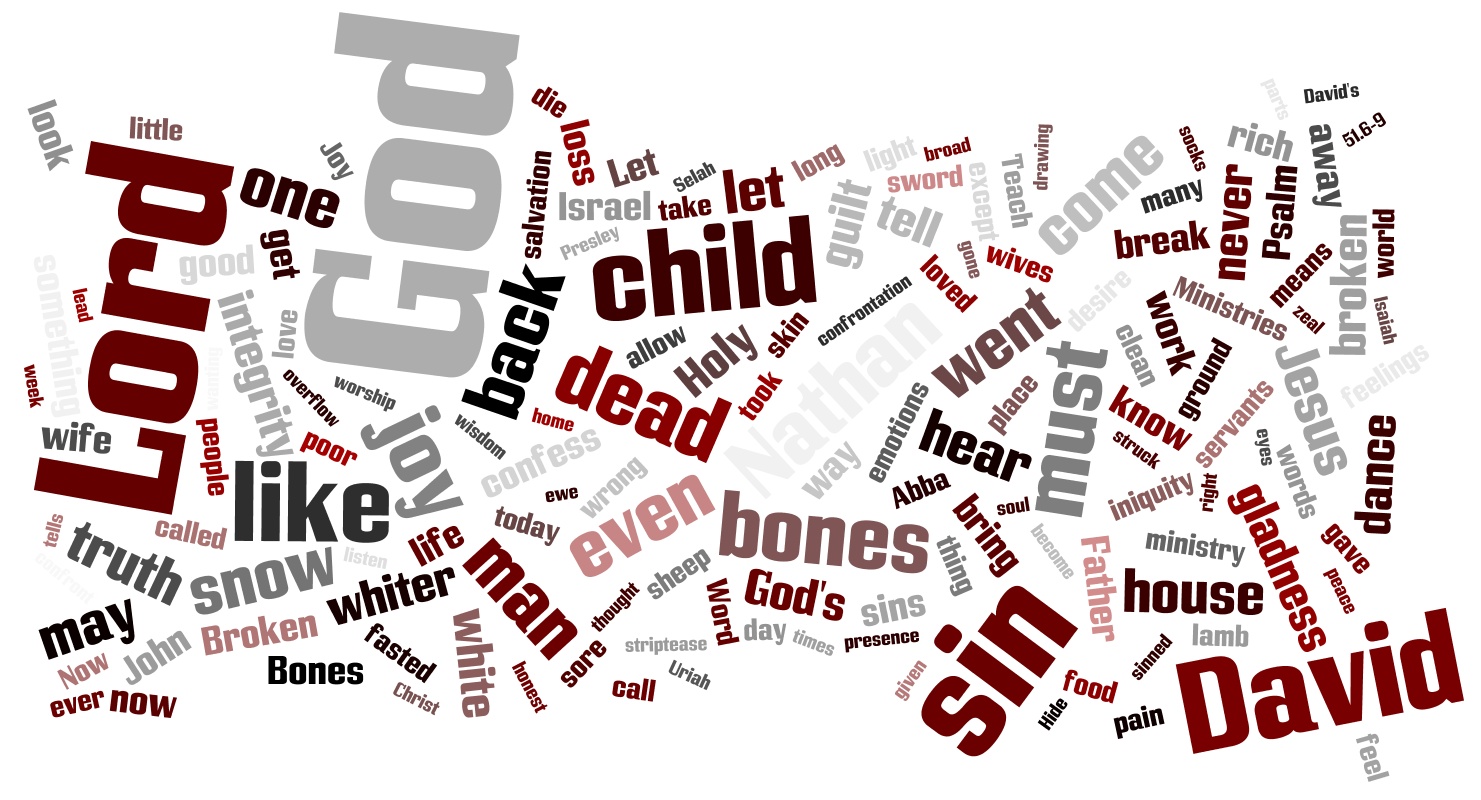| That’s Worship | ||
| Novermber 10, 2009 | Sermon by DRW | Passage Psalm 96 |
No music or introductions just me.
I have been wondering what to speak with each of you about today. It has been haunting me for a few weeks. I then asked myself “What would you say to them if this was your last chapel, last opportunity to speak?” The answer came quickly. It is a hard topic to cover because I always feel inadequate before, during, and after I present it. The topic is worship.
Worship
Its not what you are thinking. I am not going to ask you to raise your hands or sing louder. I will present worship to you in the best way I know how. But first, I have a question for you. Feel free to respond if you would like: Do you think that far too much of worship these days is irreverent? I don’t think it is purposefully, but I think it has become so for many people in America.
This is how I see people worship. It is us going before our God and asking Him to be blessed because we decided to show up. It is us going before God and expecting Him to pour out His blessings on us because we thought it good to acknowledge Him today. It is a moment in life that happens when we choose, where we choose, and how we choose. Worship today is irreverent because we see it as irrelevant. The Old Testament is full of characters that were removed from authority or killed because of these attitudes in worship. If you want three groups: the sons of Aaron, the sons of Eli, and Saul.
One of the problems associated with this is that many people don’t see their worship is irreverent or irrelevant. We see that we are giving our time to be in a Christian school or go to a church to sing to God. And that for us is hard, it is worship according to how we define worship which is singing to God. But, I think most of the problem we have in understand how worship has become irreverent and irrelevant is from our misunderstanding of what worship is.
So today I would like to answer the question of what worship is from my perspective. In short, worship is ascribing worth to something and acknowledging it. We do this quite often. We ascribe worth to our friends and give them time, express our talents before them and for them as we play a pickup game of basketball, attempt bowling [for some of you this is acting foolish], or play music with them [and sometimes for them], give them monies to accomplish something, even as trivial as helping them buy a burger to satiate their cravings, give them praise when they need it. There is much more, but do you see how we ascribe to our friends worth and in a sense worship them?
If we have chosen our friends well, we feel able to come before them because we know they will accept us, not laugh at us most of the time, not berate us for missing a shot but encourage us in how to shoot better, they won’t look at us contemptuously for the small amount of money or food we supply. We can go on, can’t we; that is why they are our friends. That is one of the problems we have because we don’t see these as true with God.
The Psalmist tells us in 29.1-2:
Ascribe to the LORD, O mighty ones, ascribe to the LORD glory and strength. Ascribe to the LORD the glory due his name; worship the LORD in the splendor of his holiness.
In other words, give Him the glory that is due His name by doing the same thing we do for our friends. Give Him His worth by giving our time, our talents, our monies, our praise, our daily life.
Psalm 96 expresses this same truth in greater detail:
1 Sing to the LORD a new song; sing to the LORD, all the earth.
2 Sing to the LORD, praise his name; proclaim his salvation day after day.
3 Declare his glory among the nations, his marvelous deeds among all peoples.
4 For great is the LORD and most worthy of praise; he is to be feared above all gods.
5 For all the gods of the nations are idols, but the LORD made the heavens.
6 Splendor and majesty are before him; strength and glory are in his sanctuary.
7 Ascribe to the LORD, O families of nations, ascribe to the LORD glory and strength.
8 Ascribe to the LORD the glory due his name; bring an offering and come into his courts.
9 Worship the LORD in the splendor of his holiness; tremble before him, all the earth.
10 Say among the nations, “The LORD reigns.” The world is firmly established, it cannot be moved; he will judge the peoples with equity.
11 Let the heavens rejoice, let the earth be glad; let the sea resound, and all that is in it;
12 let the fields be jubilant, and everything in them. Then all the trees of the forest will sing for joy;
13 they will sing before the LORD, for he comes, he comes to judge the earth. He will judge the world in righteousness and the peoples in his truth.
[Kevin: “Holy Is The Lord”]
So, what is worship? How can we see it played out in our daily lives? If we think of it in light of some of the things we do for our friends, I think we have a good start. Only, remember, they are not truly worthy of that worship only God is.
In order for us to see how worship permeates all of life, I have a few quick descriptive words for you to ponder in light of worship this morning.
[Kevin: “When the Music Fades”??????????????]
Worship is . . .
Honesty and Purity, Present Yourself by Integrating Repentance, Truth, Holiness, Diligence, and Yearning, Marveling, Revering, Seeking, Creating Love and Relationships Knowledgeably
Honesty and Purity
John 4:23
“It’s who you are and the way you live that count before God. Your worship must engage your spirit in the pursuit of truth. That’s the kind of people the Father is out looking for: those who are simply and honestly themselves before him in their worship. God is sheer being itself—Spirit. Those who worship him must do it out of their very being, their spirits, their true selves, in adoration.”
As we open today, let’s pray:
When was the last time you sat before God and honestly spoke to Him about your life? Think about that. As you sit in these pews today, tell God something you think He doesn’t know. He is sovereign and does know, He would like you to acknowledge it to yourself. This enables your worship to be honest and pure. The language doesn’t have to be perfect or polished, just honest. I remember going before God awhile back angry with Him. I yelled at Him, blamed Him for the grief I was experiencing. After a few hours and a stream of tears, I remember confessing my sins before Him because He made me realize the truth of my grief was in my choices not in Him. It was at this point of confession, that I was able to come to Him in purity. But it started with being honest with God about my feelings and honest with myself about my sin.
Continue in a state of prayer for a moment, bring yourself honestly before God today. Kevin will lead us in a rewrite of a song we sing in chapel.
[Kevin “Holiness” with the Honesty and purity in its place]
Our honesty displays our character. Honesty before God promotes honesty and purity before people. As we come transparent before Him, He allows us to be transparent before others and they see our good works (not mere words) and glorify God themselves because of us. Our honesty before Him and others displays acts of reverence and respect, dignity and majesty, to our holy God.
Our honesty and ensuing purity before God in our daily life is the basis for our receiving blessing from His hand (Psalm 125.4).
I also see worship as the act of presenting ourselves before God on a daily basis.
Presenting Yourself by
We all now the quote from Romans 12.1: I urge brothers to present yourselves as living sacrifices before God. The Message states it this way:
Romans 12.1-2 (Message)
So here’s what I want you to do, God helping you: Take your everyday, ordinary life—your sleeping, eating, going-to-work, and walking-around life—and place it before God as an offering. Embracing what God does for you is the best thing you can do for him. Don’t become so well-adjusted to your culture that you fit into it without even thinking. Instead, fix your attention on God. You’ll be changed from the inside out. Readily recognize what he wants from you, and quickly respond to it. Unlike the culture around you, always dragging you down to its level of immaturity, God brings the best out of you, develops well-formed maturity in you.
How is your daily life? Are you presenting to God on a daily basis all that you are? God doesn’t want part of your life because that is an unacceptable form of worship. He wants all of your life. He doesn’t want to be first on a list of things that need attention during the day. He wants to be at the center of all the activity, the thought, the words, the all of the day (Colossians 1.18). Are you presenting yourself before Him daily?
How is this done? How do we present ourselves?
It is done by integrating His requirements for drawing close to Him:
Integrating
Repentance,
Psalm 51 (particularly 16-17) 16-17
Going through the motions doesn’t please you, a flawless performance is nothing to you. I learned God-worship when my pride was shattered. Heart-shattered lives ready for love don’t for a moment escape God’s notice.
Truth,
John 4 reminds us that God desires people to worship Him in spirit and in Truth. This would be the truth of who He is. Jesus claimed to be the Truth. He stands before us as Judge as the holder of Truth. He demands that we live a life that reflects that truth and that is worship. It is different than honesty. Honesty can express a lie. We can honestly say we are sad and disappointed with God because we feel He has abandoned us. However, this is not a truth. The truth is that He will never forsake us and never leave us. He is ever present.
2 Corinthians 2.11 informs us of the truth that Satan is out to destroy us and we must be aware of his lies. He stands in direct opposition to Jesus who is the Truth. We must destroy these strongholds of Satan according to 2 Corinthians 10. We must represent the truth. We need to acknowledge God for who He is and obey in that truth and then we are worshiping God. We need to stay away from worshiping that which the devil presents because it isn’t God, it is more like us. We need to stay away from the half-truths the devil presents each day, much like Jesus did in the wilderness temptations, by quoting the Word of God. We need to be aware of what God’s Word says so we can know the truth and be free to live the life that God created for us to live; that is a life with Him as the focus, a life of worship.
Holiness,
God is most worshiped and glorified when we follow His will. His will, for one example, is found in 1 Thessalonians 4:3 is for moral purity both sexually and otherwise. We are to consider the ramifications of all we do in light of how it reflects His call to make us holy even as He is holy. Leviticus 10.10:
You must distinguish between the holy and the common, between the unclean and the clean,
Worship is quiet a bit of hard work. This is why I think it has become irrelevant and irreverent in our day. We are a people who love to worship and to be worshiped. It is far easier to worship our friends or possessions than it is to worship God. True worship requires diligence.
Diligence, and
even to the point of suffering as Peter reminds us (1 Peter 3:17 and 1 Peter 4:19)
Yearning, [Kevin: “The Time Has Come” ]
Psalm 42.1 describes a deer desiring the pure waters after a long and tiresome drought. Korah, the writer, describes the state of yearning for water as the state of the soul in worship. Do you desire God more than life’s basic sustenance? Ponder that as we sing “The Time Has Come”
Marvel, [Kevin: “Awesome Is The Lord Most High” ]
Much of the awesomeness of God is lost on us. We don’t see His glory because we never look up at the stars. He is Awesome. We never ponder the sunset. He is awesome. Marvel at the works of His hands, look inside you-the intrinsic parts of your body are so complex (Psalm 139). Marvel. Ponder these things as Kevin leads us in “Awesome is the Lord Most High”.
Revere,
Hebrews 12:28 (NIV)
. . . let us be thankful, and so worship God acceptably with reverence and awe,
Deuteronomy 4:10 (NIV)
“Assemble the people before me to hear my words so that they may learn to revere me as long as they live in the land and may teach them to their children.”
This means we are to get to know Him so well that we honor Him, we speak His words, fulfill His commands, as we stand in awe of Him, our life reflects it.
Seek,
Seek first Him and then He will grant you the desires of your heart. Matthew 6.33.
Creating Love and Relationships
As we attempt to accomplish this passionate pursuit of worship, we will be creating relationships with God and others based on true self-sacrificing love–love as God intended it to be (other focused, empowered by His presence).
1 John 1.1-4
From the very first day, we were there, taking it all in—we heard it with our own ears, saw it with our own eyes, verified it with our own hands. The Word of Life appeared right before our eyes; we saw it happen! And now we’re telling you in most sober prose that what we witnessed was, incredibly, this: The infinite Life of God himself took shape before us. We saw it, we heard it, and now we’re telling you so you can experience it along with us, this experience of communion with the Father and his Son, Jesus Christ. Our motive for writing is simply this: We want you to enjoy this, too. Your joy will double our joy!
That’s worship!
Knowledgeably
All this is done as we grow deeper in the knowledge of the Holy One who will become more and more the object of our desire, our passion. (John 6.68-69).
I do realize this was a bit different. But do you see how worship is irrelevant and irreverent when we limit its scope and focus. Again, look at the words used:
Honesty and purity, presenting yourself by integrating repentance, truth, holiness, diligence, and yearning, Marveling, revering, seeking, Creating love and relationships knowledgeably
If this is you, you are finally getting to the heart of worship where it is no longer about you but about the one who made you, the One worthy of your worship.
Let’s pray.
Part of worship, as we have learned is honoring those who are worthy of honor. This means we are worshiping God as we give honor to those who He has created because they are living their lives in worship of Him. We have one more song that we would like to sing. I invite Mrs. Clark to join us in this song. It is found in the acronym of the words we studied today [choir]:
Happy Birthday Mrs. Clark!
©2012 Teach for God Ministries. Used by Permission.
Permissions: You are permitted and encouraged to reproduce and distribute this material in any format provided that you do not alter the wording in any way and do not charge a fee beyond the cost of reproduction. For web posting, a link to this document on our website is preferred. Any exceptions to the above must be approved by Teach for God Ministries.
Please include the following statement on any distributed copy: By David R Williamson. ©2012 Teach for God Ministries. Website: www.teach4god.com









